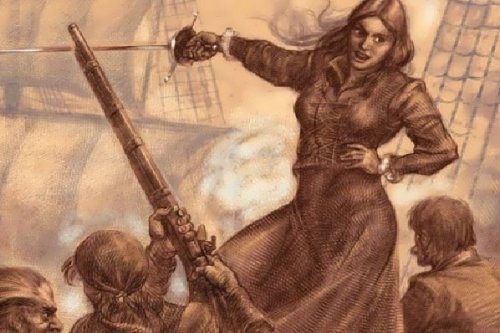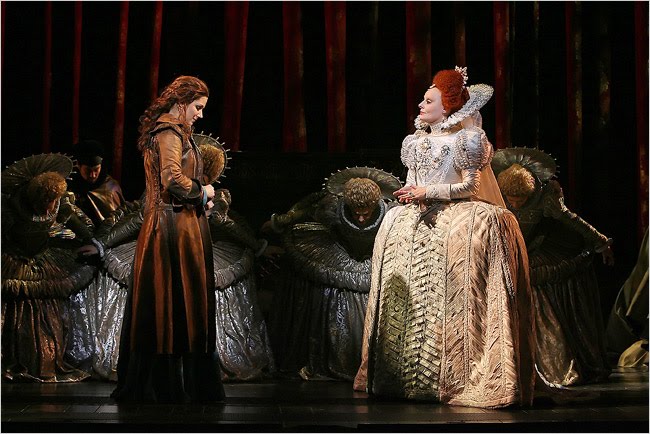This post is my entry for the Women's History Month competition, organised by @teamgirlpowa.
I am writing this post to be considered under the Women in History – Non-Fiction category. I will write about Granuaile, the renowned sixteenth-century "pirate queen" of Ireland. The sources that I use in this post will be listed at the end.

Image Credit: The Times
Today, of all days, the act of writing about a powerful woman in Irish history – one who lived her life on her own terms, who had faith in her own destiny, and would not be brought down by anyone – is an act of profound healing and self-care for me. Before I launch into Granuaile's fascinating story, I want to explain why.
Today, I am in mourning, because yesterday, my heart, and those of countless other Irish women and our allies, were smashed to pieces by the verdict of a highly publicised rape trial in the city of Belfast. All four of the men on trial were unanimously acquitted of all charges. Today, it was rightly pointed out to me that if the woman at the centre of this case had become pregnant as a result of what happened, she would have been banned from getting an abortion anywhere on the island of Ireland, because our abortion laws are still – still – indescribably restrictive and backward. Today, this is the awful situation faced by people of any gender who are capable of becoming pregnant in this country.
Today, I attended a massive rally in Dublin to support the young woman at the centre of this case. I was heartened by the fact that hundreds of people turned up to stand in solidarity ... but one guy, backed up by a group of friends, thought it would be hilarious to heckle us, mock the victim, and shower us with insults. He was standing right behind a friend of mine, who burst into tears on hearing his words. I had to try my best to comfort that friend and remain strong for her, knowing that if I said anything to those men – or sought to confront them in any way – they would simply laugh in my face. I'm only a woman, after all. Why should my opinions matter?
I can't bear to lay out the details of the case itself. I would ask anyone reading this post who doesn't live in Ireland and may want to know what happened: please, Google it yourself or read the links below for that information, rather than asking me directly. Content warnings apply for each article, though the final two – which provide stories about the national outpouring of support for the young woman – are slightly more positive in nature.
Granuaile: Pirate Queen of Ireland

Image Source: Mythomania.net
Today, I do the only thing I can do when I am upset and frightened, when I barely know how to express the way I feel, when my heart is hurting for the pain of the woman who was heinously let down by the court system yesterday, and when I know that the attitudes displayed by those men are still prevalent in Irish society today. Today, I remember one Irish woman in history whose story inspires me to carry on.
She was born in the West of Ireland in the year 1530 (there is some dispute among historians as to the exact year of her birth, but 1530 is believed to be the most likely date). She was the daughter of Dubhdhara Ó’Máille, leader of the prosperous O'Malley Clan. Dubhdara had made most of his money through trading partnerships with powerful families in England, Spain, Portugal and France. Granuaile was immersed in seafaring life from an early age, and always yearned to join her father on his voyages. According to one commonly quoted legend, her seafaring career officially began when she desired to join her father on a trading expedition to continental Europe. He told her that she could not come because her long hair would become tangled in the rigging of the ship. Not to be deterred by this information, Granuaile is said to have cut off all of her hair so that she would be able to undertake the journey.
At this time in Irish history – as was the case in most other European countries – women were usually used as pawns in a political game, married off to certain families in order to secure alliances that would increase the wealth of the men involved. Granuaile bucked this trend: she married twice, but both of these marriages left her richer.
Granuaile’s first marriage with Donal-an-Chogaidh O’Flaherty – colloquially known as "Donal of the Battles” – was arranged in approximately 1546 (when she would have been around sixteen). This marriage was arranged with the aim of enhancing the political status of both the O'Malley and O'Flaherty clans. Her marriage to Donal-an-Chogaidh brought her three children: Owen (Eoin), Mary, and Murrogh. Donal was well-known for his impulsive, vengeful, and aggressive personality. He often engaged in territorial disputes with the members of a nearby clan called the Joyces, and one particular row ended in his death. In the aftermath of Donal's death, the Joyce clan raided his castle (which had been nicknamed “Cock's Castle" because of his notorious temper), but Granuaile ferociously defended it and retained it for herself. The castle was later renamed to "Hen's Castle" in her honour.
In 1567, she married “Richard in Iron” Bourke (so called because he constantly wore a vest of chain mail). This marriage was also believed to be a political move, but there is some evidence to suggest that genuine love and affection existed between the pair. Their relationship was, however, often reported to be highly tempestuous. Legend has it that Granuaile and Richard wed under an old Gaelic law which certified the marriage for just one year, after which Granuaile sensationally “divorced” him by removing all of his belongings from Rockfleet Castle (a castle in which the couple had lived, originally owned by Richard) and telling him that he was relieved of his marital duties. The law under which they had wed entitled Granuaile to keep Rockfleet Castle from that point onwards. Historians tend to regard this incident as the end of their official marriage, but they remained an on-again, off-again couple until Bourke’s death in 1583.
Bourke and Granuaile’s relationship produced one son named Tibott-na-Long Bourke, who went on to become a parliamentarian in the Irish House of Commons. His capture at the hands of his mother’s greatest rival, Sir Richard Bingham, played a pivotal role in instigating one of the most famous incidents of Granuaile’s life: her meeting with Queen Elizabeth I of England.

A scene from the play The Pirate Queen, which dramatises the meeting between Granuaile and Queen Elizabeth I.
Elizabeth I came to power in 1558. She wished to increase English control in Ireland, but the O’Malley clan – which was then headed by Granuaile – fiercely resisted her forces’ attacks. English ships frequently found themselves helpless because of Granuaile’s skill in battle. In spring 1574, for example, Rockfleet Castle was attacked by a fleet of English ships and an army of the Queen's men. Within weeks, Granuaile and her forces had forced them into a humiliating retreat.
However, when Sir Richard Bingham was appointed governor of Granuaile’s territory in 1584, he began to impose harsh penalties on her: confiscating her lands, killing her eldest son, and imprisoning her youngest son, Tibott. This compelled Granuaile to seek out a diplomatic solution to her plight by requesting an audience with the Queen, which finally occurred in summer 1593. The two women spoke to each other in Latin, as the Queen did not know any Gaelic and Granuaile could not speak English.
Numerous legends and stories have built up around this remarkable meeting over the years. My favourite accounts of the meeting include Granuaile’s reported refusal to bow before the Queen (as she did not recognise the British monarch as the rightful Queen of Ireland) and a story which contends that she immediately threw away a handkerchief said to have been offered to her by the Queen so that she could blow her nose. This gesture shocked the English courtiers who were present, but Granuaile retorted that unlike English people, Irish people of high breeding and standards would never dream of using a soiled handkerchief a second time.

Regardless of whether that tale is true or not, I have to admit that I love the thought of Granuaile’s sheer sass in that moment. 😉 Queen Elizabeth is said to have been amused, rather than offended, by the remark. Either way, it is known that Granuaile’s remarkable powers of persuasion paid off: the Queen ended up ordering Sir Bingham to release Tibott and hand back Granuaile’s lands and possessions. In return, Granuaile offered her assistance with fighting the Queen’s enemies abroad, though she would not promise to avoid fighting the Queen’s forces on her own territories in Ireland.
For the remainder of her days, Granuaile lived a life of freedom, strength and independence, with her prowess in seafaring and battle honoured and respected. She is said to have been the only foreign rival to ever truly earn Queen Elizabeth I’s respect. Both women died in the same year: 1603.
At a time when I am deeply distressed over all of the emotions that have been evoked within me as a result of the Belfast rape trial – and when the problems that are still faced by Irish women continue to break my heart – Granuaile's story has served as a timely reminder that Irish women are tough. We kick ass. We can do absolutely anything we set our minds to. This year, we are faced with a referendum that will – if passed – lead to the repeal of the much-detested Eighth Amendment of our Constitution, which prohibits abortion in virtually all cases (including rape and fatal foetal abnormalities). The campaign is set to kick off in earnest very soon. I can't even begin to express how anxious I am about this, but hey: if Granuaile could defy just about every social convention that was imposed upon women by Irish society of the sixteenth century, almost single-handedly repel an endless series of English invasions, and somehow convince Queen Elizabeth I to give her exactly what she wanted ... we can do this. ❤️
I want to thank the lovely people behind @teamgirlpowa for running this competition! Whatever the outcome may be, I feel so much better now than I did when I began to write this post. I feel just a little bit more invigorated, inspired, and ready to face the world. This can only be a good thing.

I'm so sorry to hear of the troubles you're having there in Ireland. We've had some devastating cases here in Belize recently, and of course a shit show of awfulness coming from my former home of the US.
I loved learning more about Granuaile. I am fascinated by badass pirate queens.
Downvoting a post can decrease pending rewards and make it less visible. Common reasons:
Submit
I know. Underreporting of sexual assaults and extremely low conviction rates are found all over the world and it's truly heartbreaking. 😞 I loved writing about Granuaile though. She was incredibly badass!
Downvoting a post can decrease pending rewards and make it less visible. Common reasons:
Submit
We have to admire our badasses so we feel less powerless. Thanks for speaking up on both counts.
Downvoting a post can decrease pending rewards and make it less visible. Common reasons:
Submit
Thank you for entering!
Downvoting a post can decrease pending rewards and make it less visible. Common reasons:
Submit
Yhe rapecase is horriffic... Loved the Pirate Queen story thank you for sharing :)
Downvoting a post can decrease pending rewards and make it less visible. Common reasons:
Submit
Wow!!
I found this too late to resteem and upvote. I'll link it in a post urging others to read this. I hate, hate, hate tales of lynchings, beheadings, witch burnings, atrocities beyond my imagining, all documented in human history. I'm going to stop right now because you've unleashed a torrent, and I must go watch a brainless cat video to calm down. (Why risk prison and waste money on illegal mind-altering substances? Cats work for me!)
Downvoting a post can decrease pending rewards and make it less visible. Common reasons:
Submit
Truly a wonderful piece, emotive and passionate, and left me wanting more.
I was introduced to this by @carolkean , and I agree with her, if it was still possible, I'd upvote and resteem this. I'll definitely be reading more of your work, so I've no doubt it will happen.
Downvoting a post can decrease pending rewards and make it less visible. Common reasons:
Submit